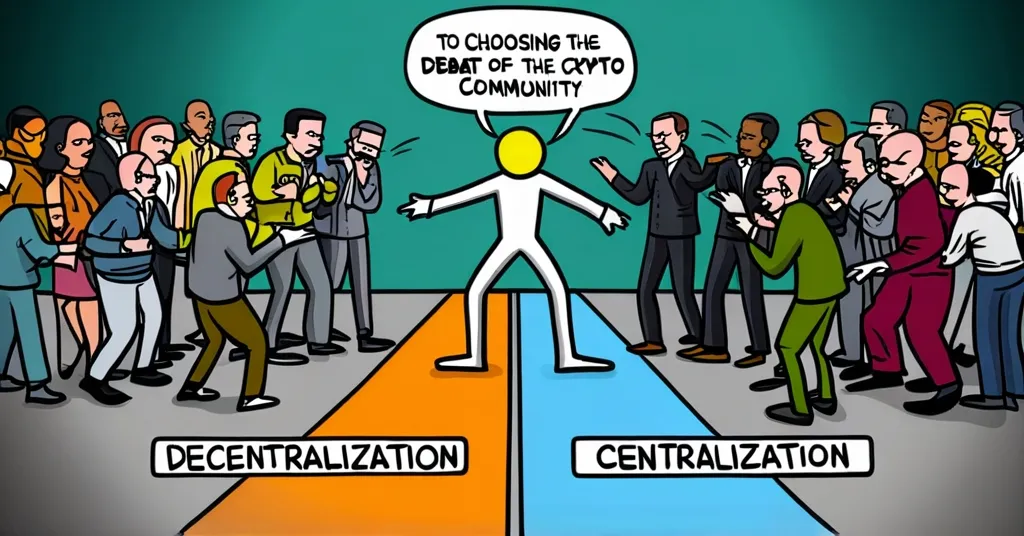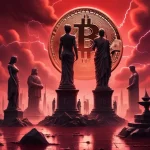Ripple CTO Backs Vitalik’s Ethereum Shake-Up Amid Centralization Debate

Ripple CTO Defends Vitalik’s Controversial Ethereum Moves
Vitalik Buterin, the mastermind behind Ethereum, has thrown a curveball at the crypto community with his latest one-sided decisions to shake up the Ethereum Foundation. Aimed at bridging leadership gaps and boosting community involvement, these moves have ignited a firestorm of debate about the essence of decentralization.
- Vitalik Buterin’s one-sided decisions to shake up the Ethereum Foundation
- Ripple CTO David Schwartz supports Buterin, advocating for choice in decentralized systems
- Critics question centralization due to past actions and token sales
- Solana founder Toly Yakovenko backs Buterin’s vision for ecosystem growth
Imagine being part of Ethereum’s community when Vitalik announced these changes out of the blue. It was like a bombshell had dropped. His goal? To address leadership gaps and ramp up community engagement. But this bold move has left many questioning whether the influence of one person, no matter how visionary, aligns with the decentralized ethos that Ethereum claims to champion.
Enter David Schwartz, the CTO of Ripple, who isn’t just sitting on the sidelines. Schwartz boldly stated,
“That is how decentralization works.”
He argues that decentralization isn’t about rigid structures but about the freedom to choose and evolve. He points to Ethereum Classic, a fork born from dissent over Ethereum’s chain rollback after the infamous DAO hack, as a testament to this principle. If you don’t like the direction Ethereum is heading, you can always choose an alternative path. The DAO hack, a significant security breach in 2016, led to Ethereum’s controversial decision to roll back the blockchain, highlighting the tension between security and decentralization.
Yet, not everyone is buying what Schwartz is selling. Critics are quick to remind us of past actions like the chain rollback, which many see as a move away from true decentralization. Moreover, the Ethereum Foundation’s recent token sales in 2024 and 2025 to manage operating costs have only added fuel to the fire. These sales, while necessary for the Foundation’s survival, raise eyebrows about the centralization of power and resources. The Ethereum Foundation sold tokens to cover operating costs, sparking debates about whether this compromises the project’s decentralized nature.
But the debate isn’t just confined to Ethereum’s community. Toly Yakovenko, the founder of Solana, has also weighed in, supporting Buterin’s vision. Yakovenko believes,
“Change, even disruptive change, is essential for any thriving ecosystem.”
He sees Buterin’s actions as a necessary catalyst for Ethereum’s growth and evolution, emphasizing that disruptive change is the lifeblood of any dynamic blockchain ecosystem.
The controversy surrounding Buterin’s actions underscores a broader tension in the crypto world. It’s a tug-of-war between the need for visionary leadership and the core principles of decentralization. As we navigate this complex landscape, the conversation about what it means to be decentralized continues to evolve, shaped by the actions and voices of those at the forefront of this revolution.
So, where does this leave us? As we champion the ideals of decentralization, freedom, and disrupting the status quo, it’s crucial to remember that the path to a decentralized future isn’t always straightforward. It’s messy, it’s contentious, and it’s constantly evolving. But it’s this very messiness that ensures the vitality and resilience of our beloved blockchain ecosystems.
Key Takeaways and Questions
- What changes did Vitalik Buterin make to the Ethereum Foundation?
Buterin made one-sided decisions aimed at addressing leadership gaps and increasing community involvement.
- How did David Schwartz defend Vitalik Buterin’s actions?
Schwartz argued that true decentralization thrives on the freedom to choose, exemplified by the existence of alternatives like Ethereum Classic.
- What is the significance of the Ethereum Foundation selling Ethereum tokens?
The sales were necessary to manage operating costs, but they have fueled debates about centralization within Ethereum.
- How did Toly Yakovenko from Solana respond to Buterin’s changes?
Yakovenko supported Buterin’s vision, stating that disruptive change is essential for any thriving ecosystem.
- What does the debate over Buterin’s actions reveal about the nature of decentralization?
It highlights tensions between the influence of a single person and the ethos of decentralization, emphasizing the importance of flexibility and choice in blockchain ecosystems.



